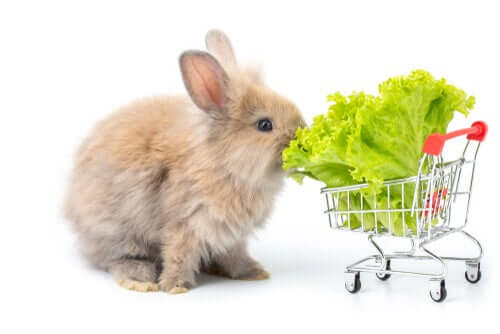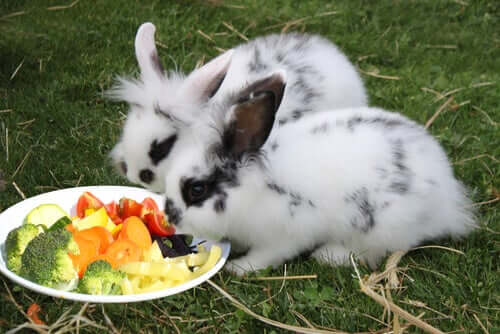The Plants You Can Feed a Rabbit

Lots of common fruits and vegetables that we eat are also safe for rabbits. The part of a plant that a vegetable comes from can also be good for its nutritional value, and can be part of a rabbit’s diet. But you can’t feed a rabbit just any plant out there.
Some of the things that are good for your rabbit are easy to get, because they’re part of our diet too. But you need to pay attention to what kinds of things you’re giving yours. Not everything is good for rabbits.
Plants you can feed a rabbit
Ground-growing vegetables like carrots, parsnips, turnips, and beets provide lots of energy, because they’re high in sugar. These plants should form a very small part of your rabbit’s diet.
Stalk vegetables like celery, chard, broccoli, and the green parts of a vegetable are the best things you can feed a rabbit. They’re low in calories and high in fiber.
Leafy greens like cabbage, spinach, carrot leaves, broccoli leaves, kale, romaine lettuce, radish leaves, and blackberry, strawberry, or raspberry leaves are all good examples of healthy food options for a rabbit.

The vast majority of seeds and grains that we eat aren’t toxic to rabbits. But they’re also high in energy and that means that it’s better not to feed a rabbit too many of them. Remember, rabbits are mainly leaf eaters, not seed eaters.
Herbs like parsley, basil, mint, romaine, sage, thyme, dill, and cilantro all make for great, tasty treats. You can grow some of them at home, too, which gives you a cheap, consistent food option for your rabbit.
Also keep in mind that some plants are toxic and others are a mix. While tomatoes are safe for a rabbit to eat, their leaves are extremely toxic to them. Never, under any circumstances, let yours eat them.
A vegetable diet
Besides sharing the same vegetables, rabbits can also eat a lot of the parts of plants that we toss out because they’re tough and fiber-rich. That’s actually what makes them so good for rabbits. This includes things like cauliflower leaves, broccoli stems, and carrot leaves.
Grocery stores often trim the leaves off of vegetables before they sell them. So, you can try going to smaller markets and organic stores to get the freshest versions.
Can you feed a rabbit wild plants?
Lots of the plants in a wild rabbit’s diet grow in people’s gardens as weeds. They can be a perfect addition to your domestic friend’s diet! Common weeds are safe for rabbits to eat, and include things like clovers, dandelions, thistle, chickweed, nettle, blackberry leaves, and shepherd’s purse, among many others.

You definitely need to get a reliable reference book on plants, because some garden plants and weeds are toxic. You should only pick plants from areas that aren’t affected by traffic pollution, pesticides, or which haven’t been contaminated by other animals.
Dry plants
When you dry a fresh plant, the water and nutrient content go down. Sugar, on the other hand, becomes even more concentrated. That basically means that dry fruits and vegetables have more calories. So, you should only occasionally let your rabbit eat these kinds of things.
Because leaves are low in sugar, you can start off by feeding them a mix of both. Combining dry leaves with hay is a great way to make it more tempting for a picky rabbit.
Introducing fresh plants
Rabbits don’t take sudden changes in their diet very well. A sudden introduction of lots of fresh plants could throw their digestion out of whack and make them sick. So, if you want to get yours to eat new foods, do it only one at a time, in small portions. That will make it easier to determine if any of them cause digestive problems in your rabbit.
You should be especially careful if you’re trying to give fresh plants to a young rabbit. They’re more sensitive, but you don’t have to go as far as never feeding them anything fresh like some older pet books used to say. Baby rabbits should ideally have eaten some kind of fresh plant before they’ve moved onto solid foods.
If you get a baby rabbit (8 weeks or older) that hasn’t eaten fresh plants before, let it get used to its new routine and environment first. Only once that has happened should you start to give it small amounts of fresh plants, like you would with an adult.
All cited sources were thoroughly reviewed by our team to ensure their quality, reliability, currency, and validity. The bibliography of this article was considered reliable and of academic or scientific accuracy.
- Ayala, E. (1966) Alimentación de los conejos. Ministerio de Agricultura: España. Recuperado el 10 de abril de 2023, disponible en: https://www.mapa.gob.es/app/biblioteca/hojas-divulgadoras/hojas_materia.asp?materiaid=ZZ0040860&page=5&materia=ALIMENTACION%20DE%20LOS%20ANIMALES
- Herrera-Soto, I., García-Flores, M., Soto-Simental, S., Zepeda-Bastida, A., & Ayala-Martínez, M. (2018). Plantas aromáticas en la alimentación de conejos y su efecto en la carne. Abanico veterinario, 8(2), 81-87. https://www.scielo.org.mx/scielo.php?script=sci_arttext&pid=S2448-61322018000200081
- Brenes, A., Brenes, J. & Pontes, M. (1977) Requerimientos nutritivos del conejo. XV Reunión Anual de la Sociedad Ibérica de Nutrición Animal. Cunicultura, 117-127. https://dialnet.unirioja.es/servlet/articulo?codigo=4212251
- Oakhurst Veterinary Hospital. (2012) Rabbit Diet. Recuperado el 4 de marzo de 2022, disponible en: https://www.oakhurstvet.com/userfiles/Rabbit%20Diet.pdf
- Aguirre, L. S., Sandoval, G. V., Medina, D. M., Martinez, O. G., & Micheloud, J. F. (2019). Acute heart failure in rabbits by avocado leaf poisoning. Toxicon, 164, 16-19. https://pubmed.ncbi.nlm.nih.gov/30946913/
- Gidenne, T. (2015). Dietary fibres in the nutrition of the growing rabbit and recommendations to preserve digestive health: a review. Animal, 9(2), 227-242. https://www.cambridge.org/core/journals/animal/article/abs/dietary-fibres-in-the-nutrition-of-the-growing-rabbit-and-recommendations-to-preserve-digestive-health-a-review/3BF3B1397F1A855401CEB0FA944B6C47
- Meredith, A. (2011). Rabbit nutrition an over view. Ir. Vet. J, 64(3), 160-164. https://www.cabdirect.org/cabdirect/abstract/20113082205
- Michigan State University Extension. (2017). Rabbit Tracks: Feeds and Feeding. Recuperado el 10 de abril de 2023, disponible en: https://www.canr.msu.edu/resources/rabbit_tracks_feeds_and_feeding
This text is provided for informational purposes only and does not replace consultation with a professional. If in doubt, consult your specialist.